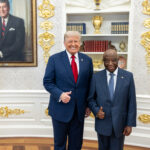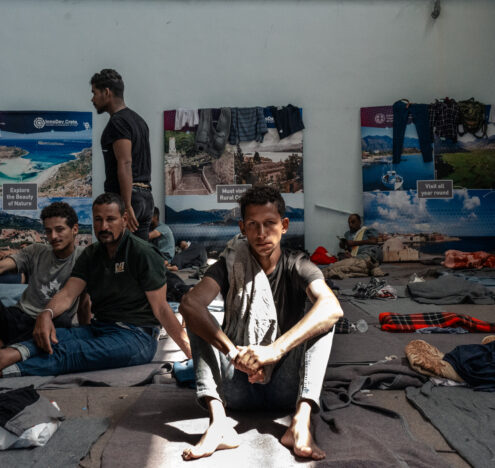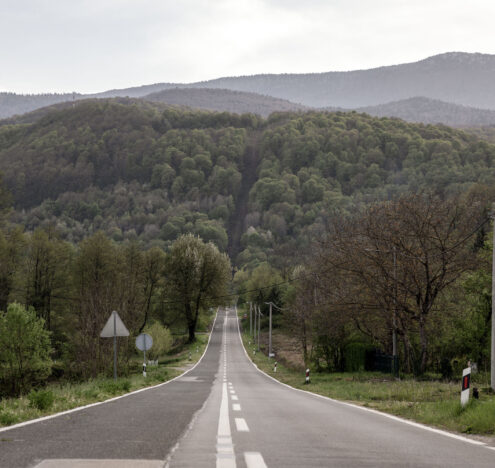Jamie Minden was a high school freshman in California when she experienced the most destructive wildfire in her state’s history. The Camp Fire ravaged multiple communities with help from high winds and drought conditions worsened by global warming. Ultimately, the blaze killed 85.
“I remember every day driving home from school, my mom would leave the radio on and we would hear the death toll,” Minden says. “And I came to the realization, in that moment, that the smoke that we were breathing in was these people’s homes. It was their belongings, their beloved possessions, and it was even their bodies. And that was a really jarring realization to come to as a 14-year-old girl.”
Now, seven years later and fresh out of college, Minden is the executive director for the youth-driven climate action group Zero Hour. She possesses intricate knowledge of the science behind disasters like the Camp Fire, and while her own experience is still a haunting motivator for her, she knows how expansive and layered the climate crisis has become.
She knows how the second Trump administration is exacerbating the climate crisis — and she wants to do what she can to stop it.
That includes stopping the expansion of the fossil fuel industry and the increased use of liquefied natural gas (LNG), which contributes to global warming and delays the transition to renewable energy.
Recently, Minden points out, Trump struck a deal with the European Union in which the EU pledged to import “unrealistically massive amounts” of crude oil, refined petroleum, and LNG from the US. Experts point out that the US doesn’t have the capacity to produce LNG at the scale the $750 billion deal calls for, nor does Europe have the capacity to receive it. Nevertheless, the deal locks both economies into a long-term reliance on fossil fuels that, in turn, decreases global demand for clean energy given the economic stature of the US and Europe.
What’s more, Minden says there’s another reason the deal is bad for Europe: security.
“I think a really great way to ensure more national security on their end is to not make these huge energy deals with the United States,” she says. “Right now, we’ve seen studies over and over again that show that clean energy is a lot better for national security than making fossil fuel deals with foreign governments.”
One such study came out of the Harvard Kennedy School shortly after Trump won reelection. The “Green Energy Statecraft” report found that a shift to producing clean energy domestically can bolster national security by cutting reliance on foreign fossil fuels and giving countries more room to maneuver diplomatically and economically without being hostage to someone else’s oil and gas.
Nathaniel Stinnett, founder of the Environmental Voter Project (EVP), explained how the US is falling behind major competitors when it comes to domestic production of clean energy.
“China is laughing at us right now as we hand them control over the new clean energy economy.” – Nathaniel Stinnett
Specifically, politicians have a longstanding tradition of scapegoating China, either for inaction or for meddling in US climate affairs (Republican Senator Ted Cruz, for example, recently claimed, without evidence, that China backs lawsuits against oil companies.)
Yet clean energy, Stinnett says, is one area where China is “eating our lunch.”
“In some ways, they are an example of what it means to take this new economy seriously,” he says. “I mean, the Trump administration has talked a lot about their new budget being a recipe for energy dominance, but it’s not. It’s a recipe for energy surrender. China is laughing at us right now as we hand them control over the new clean energy economy. Meanwhile, we Americans will now have access to less energy. It will be more expensive, and it will be dirtier and more dangerous.”
Stinnett founded the Environmental Voter Project (EVP) after working for years as a lawyer for political campaigns. He saw an opportunity to turn nonvoters who care about the environment into more consistent voters, and that’s proven difficult.
According to a survey the EVP released on July 31, Americans think about climate change more often than abortion, immigration, or gun violence. Yet, they’re less likely to view climate change as a political problem.
When asked how to address climate change, 71% of the suggestions voters offered were actions such as recycling or lifestyle changes, while only 18% were political solutions such as new legislation or regulations. Stinnett says these results are due, in part, to a “very sophisticated and expensive PR campaign from fossil fuel industries that is designed to make us blame ourselves.”
In his second term, Trump has solidified his relationship with those industries. For example, his inaugural fund received $19 million from the fossil fuel industry. Thus far, the president’s legislative moves provide $18 billion in new and expanded tax incentives for the oil and gas industry and a $6 billion reduction in the royalties energy companies must pay to extract oil and gas from public lands and waters, among other lucrative benefits.
Faced with this cozy relationship at the federal level, people like Minden and Stinnett have to get creative about finding wins where they can. That often means local advocacy.
For example, the day before he spoke with Inkstick, Stinnett’s staff reached almost 13,000 voters in Topeka, Kansas, and Detroit, where they’re mobilizing voters for the mayoral race. Another climate activist, Sharon Lavigne from Louisiana, has been a staunch advocate against the expansion of petrochemicals in the area known as “Cancer Alley.” Most recently, she is suing the council of St. James Parish for approving facilities by Koch Methanol and Formosa Plastics.
“I feel like this administration is bringing in more pollution to poison the people,” Lavigne says. “They want to put the Hyundai Steel plant in Donaldsonville; that’s 10 minutes away from my house. That’s not considering the people’s lives and where they live. So we’re going to fight back. I don’t care what administration is in office.”
This push for local action mirrors what Peter Girard, a vice president at the nonprofit Climate Central, is seeing across the US.
He argues that meaningful climate action at the government level will come from cities trying to align their work with the Paris Agreements or other key climate initiatives. San Francisco, Boston, Austin, and New York have done that. But tackling the security challenges created by an economy that favors dangerous products like LNG is an exceedingly difficult task.
“There’s a big risk that’s already playing out that a lot of countries are seeing the US as not reliable,” says Tom Ellison, the deputy director of the Center for Climate and Security.
Ellison adds that this distrust is “exacerbated” by trade discussions.
EU trade chief Maros Šefčovič said of America’s trade deal with Europe that, “It’s not only about the trade; it’s about security, it’s about Ukraine, it’s about current geopolitical volatility.” Ellison believes there’s a limit to how much countries will tolerate these fractious discussions, especially if they have other options. He also thinks countries like China will likely step into the “soft power” vacuum created by the Trump administration’s cuts to USAID.
“It’s not quite as simple as China replacing USAID, but China often has a more kind of transactional and at times coercive approach to loans and development assistance and things like that, where they’re offering good pricing and good deals and maybe using unsavory tactics with governments in the developing world,” Ellison says.
He suspects the world is moving in a direction where there is “less of an alternative to that China model,” a fact that will likely mean there is less concern with “other environmental or human rights” issues. “I think the world’s not just waiting around for the US to come around,” he says. “A lot of key relationships between states are changing, and they’re not likely to just flip back in the same way.”




















